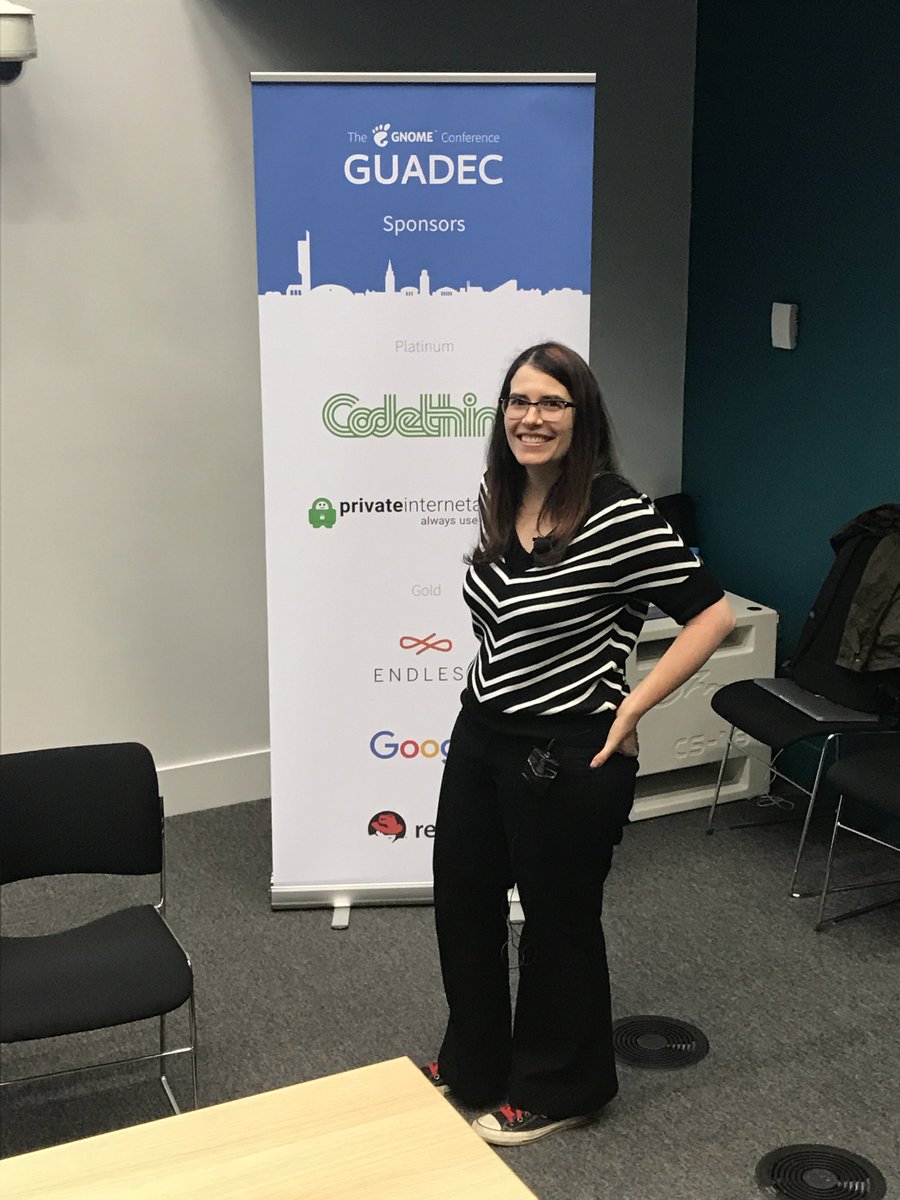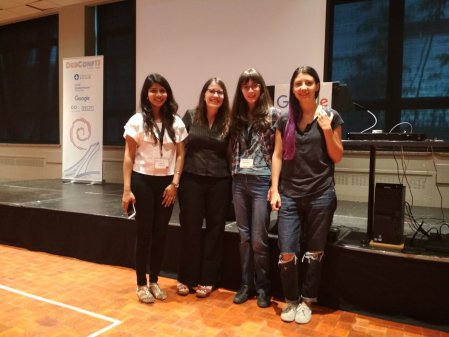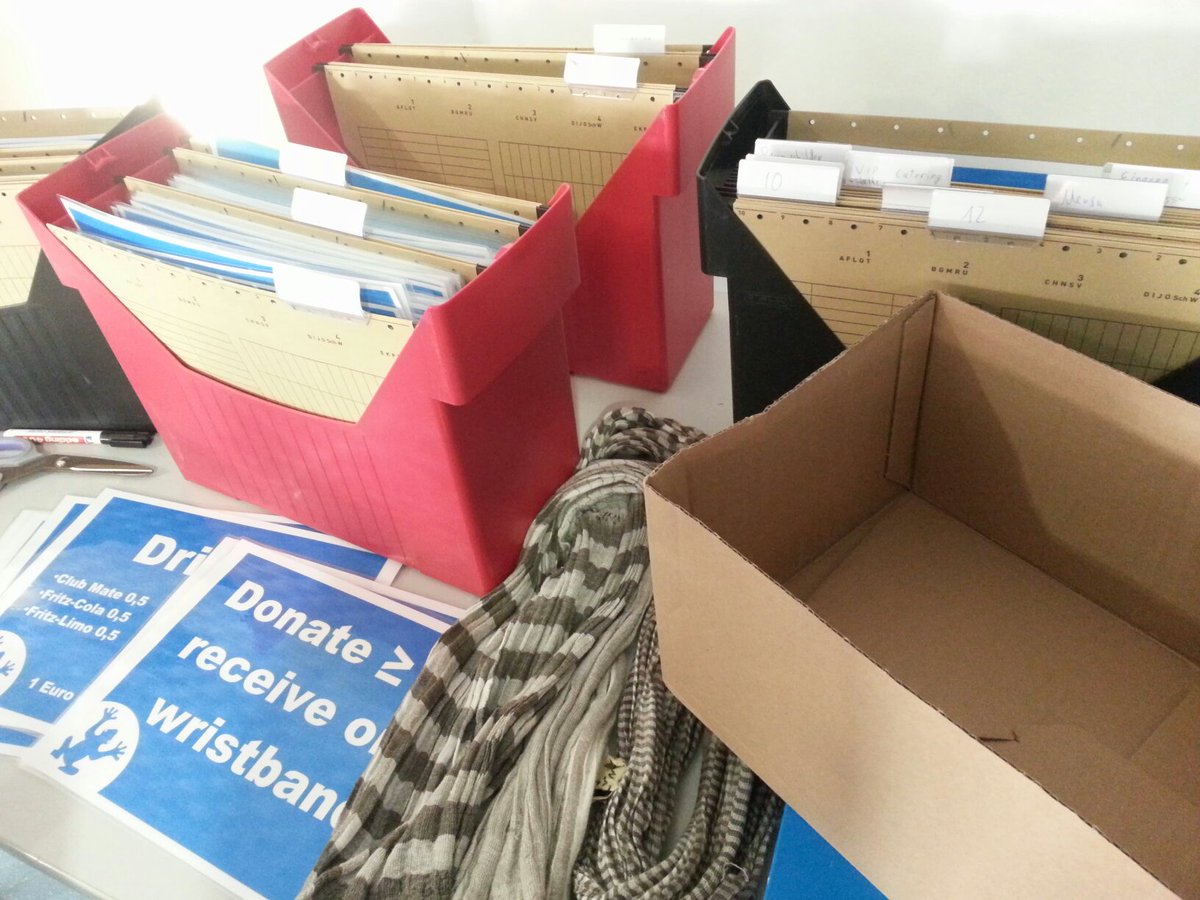![[RSS]](/static/img/feed-icon-14x14.2168a573d0d4.png) Conservancy Blog
Conservancy Blog
Late Summer Conference Report
by on September 29, 2017
I’ve been traveling quite a lot recently and have had the good fortune of participating in some dynamite conferences. Often we’re so busy with our work and travel that we aren’t able to make the time to report on it properly, which results in a lot of our acomplishments and activities happening silently1. August’s travel was intense, and while my inbox backlog continues to be a bit unnerving, I’ve got to tell you about where I’ve been before September is completely over too!
GUADEC: GNOME’s 20th Birthday!
As many readers probably know, I’m an enthusiastic user and fan of GNOME. And, as the former Executive Director of the GNOME Foundation, I was so thrilled when I was invited to give a keynote speech at the annual main GNOME conference, GUADEC. Given that this year is GNOME’s 20th birthday, it was a special year to be able to participate in the conference.
GUADEC was invigorating. With Ubuntu returning to GNOME and the success of Endless and other commercial initiatives around GNOME, the GNOME community is optimistic and focused on the future. There were many new contributors but also a great showing amongst folks who have been around the community for a long time.

My talk focused on the personal ethical responsibilities of free software contributors and how GNOME contributors can engage in the process of steering our technology in the direction of transparency and security. While I wasn’t intending to talk about medical devices very much in my talk, for a majority of the audience this was their first GUADEC or free software conference and the topic came up to illustrate some of my main points. As a society we’re building our critical infrastructure on proprietary software, entrusting single companies with some of our most important information and interactions. I strongly believe that we need technologists to stand up for ethical technology now, especially within the companies that are producing it. I recommended that contributors engage with management to discuss the long term business advantages of doing the right thing. As it turned out, there were also several young attendees in the audience who have implanted medical devices so it was a great opportunity to connect. Over time, these issues will impact more and more people.
I was excited to see Neil McGovern, the GNOME Foundation’s new Executive Director, in action. After I moved to Conservancy, I served on a Hiring Committee to help the Foundation find the right person for this role. There were many very impressive candidates, but Neil was the stand out. Neil gave an inspiring freedom-focused talk, revealing the great job he’s already doing.
There was also a big party for GNOME’s 20th birthday which was a lot of fun. I moderated a panel on the history of GNOME, and learned a lot of fun tidbits about GNOME’s past! I was also excited to see the “Pants Award” go to Bastian Ilso, who puts together awesome videos for GNOME releases (and ropes me into doing the voiceovers too).
DebConf
Soon after I got back from GUADEC it was time to head to DebConf. I could only make it for part of DebConf, which definitely left me wishing I could have been there for the whole time.

This time the conference was in Montreal, and I had the privilege of giving a presentation about Outreachy. The talk was very well attended and I left plenty of time for questions. The best part was getting to meet a number of Outreachy alums, mentors and coordinators.
I also had the opportunity to talk to Debian folks about the copyright aggregation project and to participate as a Debian Developer. This was my first Debian event since I became an official non-uploading Debian Developer. While I felt more of a responsibility to work proactively on things that Debian needed to have done, I also felt a strong sense of belonging in the community. When DebConf was held in New York seven years ago, I went briefly for a screening of Patent Absurdity, which I was interviewed in, but was so intimidated by the conference that I basically ran away immediately after! (Somewhat relatedly, I recently recorded a brief video about Imposter Syndrome.) Being recognized as an official contributor to the project helps not only to feel like your contributions are appreciated (even if they aren’t code) but also that you are more than welcome in a community - that you are a part of it.
FrOSCon
The last conference I got to this summer was FrOSCon. I hadn’t heard of this conference until recently and was surprised to learn how big it is. Primarily a local German conference, FrOSCon attracts almost 2000 people. Like FOSDEM, the event runs only over the weekend. Also like FOSDEM, the conference organization is extremely impressive. When I arrived the night before the conference, I went over to see if I could help get things set up but there were so many people there to help they actually had nothing for another person to do!
I was asked to do my standard medical devices talk as the first keynote of the conference, and I was glad I gave that particular talk - the room was full of people who hadn’t heard it. The questions I got were insightful and the enthusiasm in the discussions after I spoke was exciting. I also did a couple of interviews with local tech press reporters and met some fabulous people which led to great discussions. A few of us spontaneously gathered a working group on ethics for IoT and informed consent. Since then Emma Lilliestam, who also spoke at FrOSCon about issues related to software and cyborgs, has been writing up these issues and further developing thought on the topic.

I fully appreciated the organization of the event when I stuck around to help with takedown.
It was amazing to see everything get taken down, cataloged and organized for next year. FrOSCon is definitely a conference I would recommend to others in the future.
While the summer is over, it seems like it’s always conference season. This evening I’m delivering a keynote presentation at Ohio Linux Fest, a conference I’ve always wanted to attend. While it’s a lot of travel, I’m grateful to get the opportunity to meet with so many people interested in free an open source software and to have the chance to encourage folks to think about the important issues of our day. If you attend any conference that I’m at, please be sure to say hello!
1 Conservancy has a staff of four full time people, which includes no marketers, campaigns people or anyone focused on PR.
Karen Sandler Interviewed about Sexism and Imposter Syndrome
by on September 19, 2017
During an interview with mic.com, our executive Director Karen Sandler spoke about sexism in tech and imposter syndrome.
Donor Spotlight: Togán Labs
by on August 23, 2017
Conservancy depends on our Supporters and Donors.We rely on their financial support, of course, but they are also valued ambassadors who spread the word about Conservancy and the work we do. This is the first installment in a series featuring the companies and individuals who support Conservancy. If you're a Supporter of Conservancy and would like to be featured here please let us know!
We're kicking off this series by interviewing Beth Flanagan, CTO and Co-Founder of Togán Labs about why they have chosen to donate to Conservancy.
What is Togán Labs?
Togán (pronounced Toe-gawn) Labs Ltd. is a small startup embedded services provider based in Cork, Ireland. We are the creators of Oryx Linux, an embedded Linux distribution based around the Yocto Project and OpenEmbedded. Oryx incorporates a lightweight container runtime engine which brings the benefits of containerisation to the embedded sector without disrupting existing developer workflows. We are not just another startup. Our core philosophy is the belief that we can work, keep roofs over our heads and be responsible to our co-workers, our customers and our communities. It's not just an afterthought to us, it's designed into our company. Our board consists of 2/3rds women, our core development team is gender balanced, we require our co-workers to learn the Irish language (because without an economic basis the language will become even more endangered than it currently is).
We believe that our ethics make us a stronger company. And part of those ethics is our firm belief in open source, especially in copyleft compliance.
Why are you making this donation to Conservancy?
As IoT and embedded devices become more and more ubiquitous in our lives, it is vital that companies supplying these devices enable the consumer by providing them with complete, corresponding source. It's not just a legal obligation, it's a smart business decision. What happens when companies stop supporting firmware upgrades for devices currently on the market? We can't afford a billion devices out there with out of date firmware and no way for communities to provide community supported upgrade solutions. The work Conservancy and others do moves us towards better compliance in the embedded space.
As well, there are personal reasons I believe in the work Conservancy does. I don't have a university degree but have been a software developer for over two decades because of the existence of open source software. I learned to program because strong copyleft existed. Were it not for the ability to get source code, to understand how things worked under the hood, there is a good chance I would never have entered this industry.
Which of Conservancy's member projects do you rely on?
So many of them! As a company that provides an embedded system we certainly make a lot of use of git, uCLibC, coreboot, BusyBox, QEMU, Samba, boost and of course the kernel. As the original author of the Yocto Autobuilder, a BuildBot based CI solution for the Yocto Project, I made heavy use of BuildBot and Twisted.
How do you see the future of software freedom?
I believe we are at a very important crossroads and that it is vital that our communities, corporations and organizations start having open and honest discussions about what the future of open source looks like and what we, as communities, value. I believe in collaboration, both in open source development and open source processes. I want to see all stakeholders around open source compliance move forward towards that goal.
Why do you think folks should open up their own wallets and become Supporters of Conservancy?
I have built a career and a company around a few billion euro software ecosystem I downloaded 20+ years ago for free! This software was started and built by people who believed that software should be free and open and it is vital that this shared value is protected, both from a moral perspective and a business one. I believe that Conservancy is one of the many organisations working towards that goal and the work they do, from Outreachy to compliance activities, enhances and enables our ability to deliver on the promise that is open source.
Goodbye To Bob Chassell
by on July 3, 2017
It's fortunately more common now in Free Software communities today to properly value contributions from non-developers. Historically, though, contributions from developers were often overvalued and contributions from others grossly undervalued. One person trailblazed as (likely) the earliest non-developer contributor to software freedom. His name was Robert J. Chassell — called Bob by his friends and colleagues. Over the weekend, our community lost Bob after a long battle with a degenerative illness.
I am one of the few of my generation in the Free Software community who had the opportunity to know Bob. He was already semi-retired in the late 1990s when I first became involved with Free Software, but he enjoyed giving talks about Free Software and occasionally worked the FSF booths at events where I had begun to volunteer in 1997. He was the first person to offer mentorship to me as I began the long road of becoming a professional software freedom activist.
I regularly credit Bob as the first Executive Director of the FSF. While he technically never held that title, he served as Treasurer for many years and was the de-facto non-technical manager at the FSF for its first decade of existence. One need only read the earliest issues of the GNU's Bulletin to see just a sampling of the plethora of contributions that Bob made to the FSF and Free Software generally.
Bob's primary forte was as a writer and he came to Free Software as a technical writer. Having focused his career on documenting software and how it worked to help users make the most of it, software freedom — the right to improve and modify not only the software, but its documentation as well — was a moral belief that he held strongly. Bob was an early member of the privileged group that now encompasses most people in industrialized society: a non-developer who sees the value in computing and the improvement it can bring to life. However, Bob's realization that users like him (and not just developers) faced detrimental impact from proprietary software remains somewhat rare, even today. Thus, Bob died in a world where he was still unique among non-developers: fighting for software freedom as an essential right for all who use computers.
Bob coined a phrase that I still love to this day. He said once that the
job that we must do as activists was “preserve, protect and promote
software freedom”. Only a skilled writer such as he could come up
with such a perfectly concise alliteration that nevertheless rolls off the
tongue without stuttering. Today, I pulled up an email I sent to Bob in
November 2006 to tell him that (when Novell made their bizarre
software-freedom-unfriendly patent deal with Microsoft)
Novell
had coopted his language in their FAQ on the matter. Bob wrote
back: I am not surprised. You can bet everything [we've ever come up
with] will be used against us.
Bob's decade-old words are prolific
when I look at the cooption we now face daily in Free Software. I acutely
feel the loss of his insight and thoughtfulness.
One of the saddest facts about Bob's illness, Progressive Supranuclear Palsy, is that his voice was quite literally lost many years before we lost him entirely. His illness made it nearly impossible for him to speak. In the late 1990s, I had the pleasure of regularly hearing Bob's voice, when I accompanied Bob to talks and speeches at various conferences. That included the wonderful highlight of his acceptance speech of GNU's 2001 achievement award from the USENIX Association. (I lament that no recordings of any of these talks seem to be available anywhere.) Throughout the early 2000s, I would speak to Bob on the telephone at least once a month; he would offer his sage advice and mentorship in those early years of my professional software freedom career. Losing his voice in our community has been a slow-moving tragedy as his illness has progressed. This weekend, that unique voice was lost to us forever.
Bob, who was born in Bennington, VT on 22 August 1946, died in Great Barrington, MA on 30 June 2017. He is survived by his sister, Karen Ringwald, and several nieces and nephews and their families. A memorial service for Bob will take place at 11 am, July 26, 2017, at The First Congregational Church in Stockbridge, MA.
In the meantime, the best I can suggest is that anyone who would like to posthumously get to know Bob please read (what I believe was) the favorite book that he wrote, An Introduction to Programming in Emacs Lisp. Bob was a huge advocate of non-developers learning “a little bit” of programming — just enough to make their lives easier when they used computers. He used GNU Emacs from its earliest versions and I recall he was absolutely giddy to discover new features, help document them, and teach them to new users. I hope those of you that both already love and use Emacs and those who don't will take a moment to read what Bob had to teach us about his favorite program.
Next page (older) » « Previous page (newer)
1 2 3 4 5 6 7 8 9 10 11 12 13 14 15 16 17 18 19 20 21 22 23 24 25 26 27 28 29 30 31 32 33 34 35 36 37 38 39 40 41 42 43 44 [45] 46 47 48 49 50 51 52 53 54 55 56 57 58 59 60 61 62 63 64 65 66 67 68
